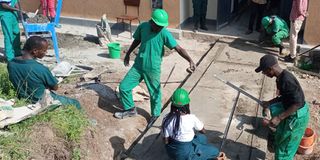Life skills are must for wholesome education

What you need to know:
- Not many people go far in life and make significant strides in life that positively affect their communities with academic knowledge only.
- Life skills include among others, critical thinking skills, decision-making, communication skills ; being able to express oneself but also listen, coping, empathy, etc.
During a symposium for the Adolescent Girls Education in Crisis Initiative held in Kampala on Thursday September 25, the ministry of education called on educational institutions to prioritise life skills training to equip adolescents with essential soft skills to help them overcome challenges that could derail their education and health.
Ms Angella Nansubuga, the programme assistant for Finance and Administration at the Ministry said adolescents face increasing challenges and therefore need skills like confidence, self-esteem, effective communication, self-awareness, critical thinking, collaboration, and resilience to navigate daily life.
She stated that the ministry has already integrated life skills training into the curriculum but stresses that a more comprehensive, whole –school approach is needed involving learners, teachers and other school structures.
Not many people go far in life and make significant strides in life that positively affect their communities with academic knowledge only. A wholesome education must have more than academics and that is why highlighting the need to inculcate life skills training in the curriculum is key. Yes it will help them overcome challenges that could derail their education and health but will only bear tangible fruit if all stakeholders are involved and have the same goal or at least understand the importance of these life skills. If this is so, then we all will be intentional in their promotion and development. Stakeholders in this case as mentioned by Ms Nansubuga include teachers, learners and even parents.
For instance, learners must be encouraged to speak up confidently, effectively but respectively rather than stifled in the name of respect for elders. As mentioned at the symposium, when young people are confident enough to speak up, they might not be victimized by those who seek to take advantage of them for instance in cases of sexual exploitation and abuse.
And as is common speak, it’s better to get them when they are still young and when they are old enough to now take up leadership in their communities and at various levels and platforms, they will already be equipped with the right soft skills to be able to live up to their full potential as leaders or simply as members of whatever society life with serve them up to.
Life skills include among others, critical thinking skills, decision-making, communication skills ; being able to express oneself but also listen, coping, empathy, etc.
It’s good to test and access how the young people in your circle of influence are doing when it comes to these and other life skills and then help them develop them.




